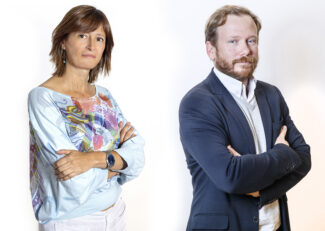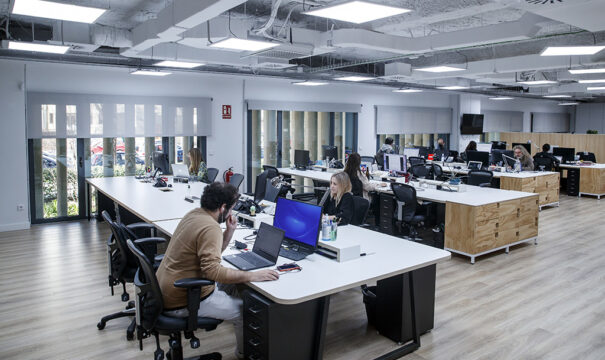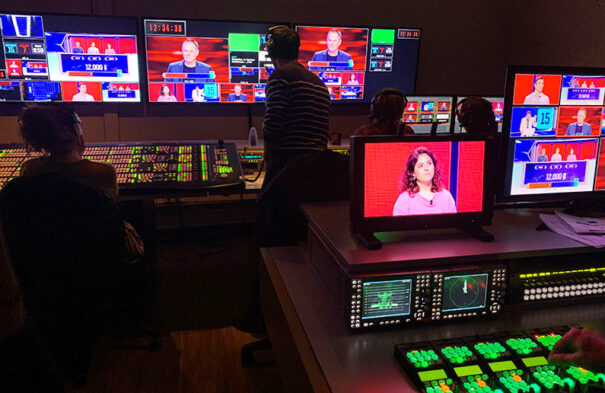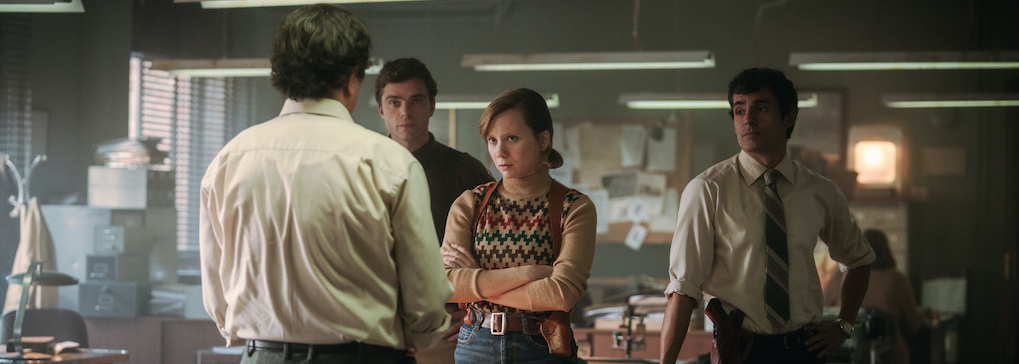Mediacrest's ambition: an unusual production company sustained by technology and talent
Emma García, VP International Sales & Coordination, y Diego Mazón, director corporativo y de comunicación, permiten conocer más detalles de la filosofía, operativa y proyectos de Mediacrest, productora con un ascenso vertiginoso que se apoya en un importante equipo humano sin renunciar a las ventajas de la tecnología.
 “Inusual”. Con esta palabra, Emma García define la naturaleza de Mediacrest, rara avis entre las productoras estatales que ciertamente puede provocar arqueos de ceja entre los más escépticos. Surgida hace apenas cinco años, la productora se ha labrado un nombre en el mundo de la Audiovisual production apoyándose en éxitos televisivos como la adaptación de The Hunter, proyectos ambiciosos a futuro como Democracia, hitos tecnológicos como Mapi o la captación de talento de toda la industria audiovisual, personificado en figuras como Gerardo Olivares (documental), Alberto Macías (ficción) o Hugo Tomás (entretenimiento). Todo ello, con la confianza de nombres como RTVE, À Punt, Discovery, Movistar+, EiTB, Canal Sur, Telemadrid, Discovery, ITV, NHK, Yle or ViXamong others.
“Inusual”. Con esta palabra, Emma García define la naturaleza de Mediacrest, rara avis entre las productoras estatales que ciertamente puede provocar arqueos de ceja entre los más escépticos. Surgida hace apenas cinco años, la productora se ha labrado un nombre en el mundo de la Audiovisual production apoyándose en éxitos televisivos como la adaptación de The Hunter, proyectos ambiciosos a futuro como Democracia, hitos tecnológicos como Mapi o la captación de talento de toda la industria audiovisual, personificado en figuras como Gerardo Olivares (documental), Alberto Macías (ficción) o Hugo Tomás (entretenimiento). Todo ello, con la confianza de nombres como RTVE, À Punt, Discovery, Movistar+, EiTB, Canal Sur, Telemadrid, Discovery, ITV, NHK, Yle or ViXamong others.
Frente a modelos de crecimiento cautelosos, optando por acercamientos boutique con apenas unos pocos proyectos en desarrollo, Mediacrest elige la ambición. Decenas de proyectos en diferentes fases ocupan el día a día de los 37 miembros del equipo, que se lanzan a mercados europeos y latinoamericanos para perseguir marcar historia en la industria televisiva con el sello de calidad que acompaña a la industria española desde hace un lustro. El conocimiento transversal sobre Mediacrest of Emma García and Diego Mazón permite descubrir los porqués de una productora con una exigencia tan alta como sus metas.
Transversalidad: eje de Mediacrest
¿Por qué es importante para Mediacrest seguir remarcando su identidad transmedia en un contexto mediático que ya ha estandarizado este término?
Diego Mazón: Es importante en la medida que sirve a los dos pilares de la productora: las personas y el público. El concepto transmedia implica, por encima de todo, estar atento de por dónde se mueven las tendencias tecnológicas y de contenidos. Es un área que estamos trabajando ahora mismo desde el punto de vista de las redes sociales, el posicionamiento de marca o el cómo impactar a un tipo de público que ya no vive en una sola pantalla y que no consume el audiovisual como lo hacía hace diez años. Todos estos son conceptos que tenemos en cuenta a la hora de desarrollar cada idea. Además, de cara a futuro, seguiremos explorando este concepto en vertientes como los podcast para poder seguir generando productos e IP.
Emma García: En Mediacrest, contamos con tres estructuras de trabajo: entretenimiento, ficción y documental. Sin embargo, no son áreas separadas, sino que trabajan de forma conjuntas; hay ideas que llegan a la compañía que aterrizan en una, pueden discutirse entre varias y acabar en otro territorio. Las líneas entre géneros se están borrando, como podemos ver en las plataformas y en lo que consume la gente. Por eso, hemos incorporado esta filosofía desde el primer día en los equipos, la cual fomentamos y creemos que es enriquecedora. Así que sí, nuestra identidad es transmedia y también podríamos decir transgénero.
(DM): Ahora mismo, de hecho, se está manteniendo una reunión que a priori no pensarías: Alberto Macías, responsable creativo de ficción, y Tania Maroto, que es de entretenimiento puro y duro. Ambos están dando vueltas a una idea que tenían. Es bonito ver esa búsqueda de nuevos universos en departamentos que, en otros momentos, podían ser completamente estancos.
¿Es esa búsqueda de la transversalidad de sus contenidos lo que consideran que diferencia a Mediacrest de otras productoras?
Diego Mazón: “Tenemos uno de los mejores equipos que hay ahora mismo en la Audiovisual production in Spain”.
(DM): Una de las cuestiones fundamentales que nos definen es ser capaces de quitar las etiquetas y jugar a cosas muy diferentes. Creo que tenemos uno de los mejores equipos que hay ahora mismo en la producción audiovisual en España en todas las áreas, y eso ayuda mucho a que esa transversalidad de la que hablaba Emma tenga una dimensión mucho mayor. Otra clave desde nuestros inicios fue la decisión de incorporar una visión internacional para buscar productos que traer a España y conseguir alianzas externas. Somos una productora española y, evidentemente, tenemos que producir en España, pero el mercado, a partir de la irrupción de las plataformas, es global. El producto que podemos generar se puede ver en Albacete y en Arizona. Eso nos ha llevado a tejer alianzas fuera de España de gran calado. Ahora estamos desarrollando un proyecto con Yle, la televisión pública finlandesa, y con Dynamo for ViX+ dirigido al Estados Unidos latino.
(EG): Nuestra identidad ha sido internacional desde el día uno. No hemos tenido miedo a salir incluso arrancando proyectos fuera y trayéndolos luego, creando contenido que funcione igual fuera que dentro.
37 personas: una estructura singular
¿Cómo es la estructura actual de Mediacrest, al margen de los equipos que podáis dimensionar para la producción de cada formato?
(DM): Actualmente, Mediacrest está formada por 37 personas. Ponemos un especial acento en la parte creativa; hay un núcleo muy importante de creativos de ficción, entretenimiento y documental. Al final, de lo que se trata es de que esas 37 personas sean capaz de empujar a la vez El cazador, Democracia o la serie con Yle.
(EG): Cuando me dirijo a los mercados internacionales solemos dar datos como que contamos con siete desarrolladores de ficción escribiendo en el grupo de guion, cuatro personas en entretenimiento, Gerardo Olivares, que vale por unos cuantos en documentales… Es bastante inusual en la estructura de una productora que tiene apenas cuatro años que la dirección haya apostado por crear una estructura tan fuerte. Esto se debe a que nuestro objetivo siempre ha sido generar IP propia y proyectos muy potentes.
Como ha comentado, la estructura de Mediacrest es singular en el mercado español. ¿En qué se sostiene su crecimiento? ¿Mediacrest se sustenta en base a sus proyectos actuales o es una apuesta por parte de los inversores de cara a su consolidación futura?
Emma García: “Las producciones que hemos sacado adelante justifican nuestro equipo; hemos tenido una combinación de buena suerte, buen hacer y buenos Fellow Travelers que nos han permitido mantener nuestra estructura”.
(EG): Entendemos que choca, ya que somos conscientes de que contamos con una estructura inusual. La gente nos suele preguntar cómo funcionamos y sacamos los proyectos adelante con un equipo tan grande. Hay un poco de las dos cosas. Las producciones que hemos sacado adelante justifican nuestro equipo; hemos tenido una combinación de buena suerte, buen hacer y buenos compañeros de viaje que nos han permitido mantener nuestra estructura. Mi papel no es dar números, pero están saliendo. También te puedo decir que, al ser una apuesta tan fuerte, el nivel de exigencia interno es elevadísimo. Cuando tienes un equipo que apuesta por personas de primer nivel, se esperan resultados a la altura. Hasta ahora, hemos sido capaces de traer un retorno que justifica todo el equipo que traemos como empresa. Eso no significa que nos podamos dormir en los laureles. Cada año nuestros objetivos son mayores, más ambiciosos. Puede intimidar, pero creemos que, sin grandes objetivos, al final no hay grandes resultados.
(DM): También ha sido importante la confianza de los inversores, que han decidido apostar por este talento. Incluso durante la pandemia, en el momento del confinamiento, se apostó no solo por mantener el equipo, sino por hacerlo crecer. Y eso está dando frutos. Hemos trabajado para Telemadrid, Canal Sur, Discovery, RTVE y estamos en ello con ViX+ o Yle. Es importante remarcar que tampoco es un crecimiento descuidado. Tenemos una parte creativa y empresarial que conjugan muy bien, y eso nos ha permitido crecer con responsabilidad.
Mediacrest: factoría de originales y búsqueda de oportunidades
¿En cuántos proyectos están trabajando Mediacrest actualmente?
(EG): Ahora mismo tenemos en marcha la temporada 10 de The Hunter, que es la versión española de The Chase de ITV, con lo cual tenemos muy afianzado uno de los productos estrella de TVE; producimos un par de temporadas de Beat The Chaser, que es el Prime Time of El Cazador, que también estamos hablando de renovar; estamos preparando Democracia para TVE, que es una serie de ficción que ganó el primer premio en Conecta Ficción; y Una casa en la playa, una serie de formato corto para Playz. Con Dynamo, productora de Colombia, estamos preparando Nautilus, producción para ViX+ basada en una historia real de narcotráfico que debería estar lista a final de año, y con Yle estamos dando forma a 17 kiloherzios, para la que estamos terminando de buscar financiación y ya contamos con un socio en Brasil. Es una producción muy internacional, a corriente de lo que se está buscando ahora, pero somos un poco cabezotas. Cuando tenemos proyectos que nos gustan, las corrientes no nos afectan.
(DM): With Gerardo Olivares posiblemente comenzamos el rodaje de una película en julio. Originalmente se originó como un documental, pero ha pasado a ser una ficción que se grabará en la Patagonia y se llama Lonely Man (El hombre del fin del mundo). Pero vaya, en ficción, dependiendo de su estado, puede haber hasta 20 proyectos. En entretenimiento estamos preparando varias propuestas para MIPTV.
 ¿Cómo se desarrolla su proceso de creación de contenidos? ¿Confían plenamente en desarrollos in-house? ¿Abren la puerta a oportunidades externas?
¿Cómo se desarrolla su proceso de creación de contenidos? ¿Confían plenamente en desarrollos in-house? ¿Abren la puerta a oportunidades externas?
(EG): Contamos con diferentes fórmulas, pero por la que hemos apostado es por contar con un equipo propio que genere ideas desde dentro. Eso no significa que no estemos abiertos a recibir propuestas, que de hecho llegan constantemente. Todo lo analizamos y filtramos. Somos muy selectivos, pero hay proyectos externos como Democracia por los que hemos apostado y con los que estamos encantados de colaborar. Tampoco nos cerramos a colaboraciones con productoras. Y luego, por supuesto, tenemos una persona dedicada a buscar formatos interesantes para traer y adaptar al mercado español, como ha sido el caso de The Hunter. The mercado español es muy conservador en cuanto a formatos de entretenimiento, por lo que sigue siendo muy importante para nuestra estructura ser capaces de traer formatos que ya hayan demostrado en otros países que funcionan.
¿Mediacrest se siente cómoda compartiendo la IP de un proyecto o siendo una pata más de una coproducción entre diferentes agentes?
(EG): Si nos pudiéramos permitir el lujo de decidir en cada proyecto el camino a seguir, nuestro objetivo sería siempre retener la IP y conseguir financiar los proyectos a base de ventas. Ese es el objetivo ideal especialmente en la ficción, un área en el que la rentabilidad de un producto se desarrolla, sobre todo, a largo plazo. ¿Qué sucede? Vivimos en el mundo que vivimos. Si mañana viene Netflix y nos encarga un proyecto, vamos a estar encantados de producir para Netflix. Al final, al trabajar para terceros por encargos, lo que pierdes en IP te compensa en visibilidad; si todo va bien, tienes suerte y creas un buen producto, vas a tener un alcance espectacular. Es lo que ha pasado con las producciones españolas. Gracias a las plataformas nos hemos dado a conocer en el mundo. Por todo esto, estamos abiertos a todo un abanico de posibilidades.
La tecnología: paleta para lo creativo y valor para el broadcaster
Otra de las formas en las que se presenta Mediacrest al mundo es con su apuesta por la tecnología. ¿Cuál es su visión sobre la tecnología en el seno de una productora audiovisual?
(DM): La tecnología es una herramienta que tiene que apoyar a los equipos creativos y de venta. Por sí misma, si no tienes personas detrás, creatividad y corazón, no sirve de nada. En Mediacrest, la tecnología se presenta de varias formas. Por un lado, trabajamos mucho con una empresa hermana que es Manifiesto, una agencia de publicidad con un amplio trabajo tecnológico aplicado a marcas: análisis del tipo de mercado, comportamiento en el ámbito digital… Todo es muy interesante para nuestros planteamientos. Luego, en tecnología de producto, hicimos Mapi, un hito tecnológico para el que hemos usado la misma tecnología que se usa para Avatar o la que usaron los japoneses en Chiko’s Challenge, el original de Mapi.
(EG): Podemos decir incluso que nuestra tecnología es más avanzada que la versión japonesa, ya que conseguimos producir el programa en directo cuando ellos no lo consiguieron…
(DM): Así es. Conseguimos aplicar la tecnología en directo, lo que nos abre un mundo de posibilidades en esa línea. Al final, la tecnología nos tiene que permitir ayudar a los equipos a que la creatividad tenga una dimensión más, permitiéndote imaginarte productos distintos a los que hasta ahora se os habían ocurrido.
¿La tecnología es un valor para los clientes de Mediacrest? ¿Broadcasters y plataformas aprecian esta apuesta decidida por la tecnología?
Emma García: “Con Mapi, hicimos una ejecución impecable. The NHK estaba asombrada de que lo que ellos tardaban varias semanas en acabar en postproducción, nosotros lo conseguíamos tener editado desde la grabación”.
(EG): Lo que se aprecia es la capacidad de aplicarla. Puedes traer una idea brillante, pero si tú no aportas la seguridad y tranquilidad de que eres el socio adecuado para ejecutarla correctamente, no va a estar tranquilo. Con Mapi, hicimos una ejecución impecable. La NHK estaba asombrada de que lo que ellos tardaban varias semanas en acabar en postproducción, nosotros lo conseguíamos tener editado desde la grabación. Esto nos da una tarjeta de visita estupenda. Supimos encontrar los socios adecuados en el área tecnológica y responder en un tiempo muy limitado.
 ¿Tienen en mente aprovechar el conocimiento tecnológico que lograsteis con Mapi en algún otro proyecto futuro?
¿Tienen en mente aprovechar el conocimiento tecnológico que lograsteis con Mapi en algún otro proyecto futuro?
(DM): En mente y en desarrollo. No hablamos solo del diseño tecnológico del plató, sino de que el propio software con el que trabajamos fue aprendiendo e incorporando nuevos gestos. Esto es algo superinteresante para varios desarrollos en los que estamos metidos.
(EG): Hemos dado al equipo una nueva paleta, y ahora son capaces de dibujar sus proyectos sin la limitación habituales de los platós o las personas. Estamos trabajando en ello. De hecho, hay un proyecto bastante avanzado, muy divertido y muy interesante que estamos preparando. Tenemos a muchos creativos, gente muy loca y divertida; la adecuada para que se les vaya un poco la pinza. Con los socios tecnológicos adecuados, tenemos la capacidad de juntarlo todo y salir a vender el producto que salga.
Mediacrest también cuenta con una división de Business Intelligence, algo habitual en productoras centradas en el mundo digital, pero no tanto en aquellas dedicadas a la ficción, documental y entretenimiento. ¿Qué aporta a su operativa?
(DM): Aprovechamos mucho toda la capacidad que tiene nuestra empresa hermana, Manifiesto, para conocer el comportamiento de la audiencia. Todos estos datos te sirven para entender al público. Muchas tendencias del audiovisual y otros sectores pueden llegar a confluir en el comportamiento del consumidor, que es el tipo de entendimiento que te aporta el business intelligence. Ese conocimiento nos sirve como apoyo a toda la fase de creatividad. Luego también es importante el análisis del comportamiento de las redes sociales. Hemos comprobado, por ejemplo, que la mitad de nuestra audiencia digital para The Hunter viene de Latinoamérica. Esa es una información que tenemos y que, si bien puede que no sirva para este producto, sí ayuda a tener una visión internacional y servir para futuros proyectos. También está el caso de Mapi, que fue un fenómeno absoluto en redes sociales.
¿La estrategia de Mediacrest también pasa por aglutinar recursos tecnológicos de producción y postproducción, o prefieren trabajar con proveedores externos?
Diego Mazón: “Nuestra apuesta es el talento creativo. Todo lo demás lo construimos con gente en la que tenemos confianza”.
(DM): Trabajamos todo a terceros, con quienes trabajamos con un importante nivel de exigencia. Nuestra apuesta es el talento creativo. Todo lo demás lo construimos con gente en la que tenemos confianza.
¿Planean continuar con este modelo a corto y medio plazo?
(EG): Por ahora, esa parte se queda fuera.
(DM): Hay gente muy buena en el exterior y solemos trabajar con ellos estupendamente.
La hiperespecialización ha muerto… ¡Larga vida a lo generalista!
Partiendo del conocimiento de la industria que posee Mediacrest, ¿qué tendencias pueden identificar en el audiovisual actual?
(EG): Los Contests están siendo una parte muy importante, ya que fidelizan. Además, algunas cadenas están tratando de modificar su identidad y se quieren apoyar mucho en este tipo de contenido. Podemos decir que están de moda, sin duda. Los documentales sobre influencers o personajes con muchos seguidores también son tendencia. Las plataformas y las cadenas están buscando IP, y al final, esa IP puede ser cualquier cosa que te traiga cierta garantía de audiencia. Es así de sencillo. Algo que, en el mar de fotos que te encuentras al navegar por una plataforma, puedas reconocer instantáneamente. El nombre de un libro clásico, aunque te pueda llevar a un contenido que diste a lo que tú conoces al pinchar, o un influencer que tiene dos millones de seguidores y que tienes la garantía de que, por lo menos, reconocerán la cara. En cuanto a documentales, estamos viendo que, pese a que cada vez hay más plataformas y canales, las temáticas se van estrechando. En lugar de haber un enriquecimiento en cuanto a contenidos y variedad de temáticas, hay una necesidad absoluta de captar al cliente y mantenerlo, por lo que se está volviendo a temáticas amplias que capten el mayor rango generacional posible. Es un poco triste, ya que todos teníamos la esperanza de que tanta plataforma y canal enriqueciera la oferta.
 ¿Qué ha sucedido para que esa tendencia de la hiperespecialización de contenidos, tan en boga hace unos años, haya derivado en un retorno al modelo generalista?
¿Qué ha sucedido para que esa tendencia de la hiperespecialización de contenidos, tan en boga hace unos años, haya derivado en un retorno al modelo generalista?
(EG): Un exceso de competencia: lo que se veía venir. Hay demasiados canales y plataformas, y se ha dado demasiado gasto en producción que no ha traído el retorno esperado. Eso ha provocado que se haya cerrado el grifo y que, de pronto, se estén vigilando mucho más las producciones en búsqueda de ese retorno en forma de nuevos abonados. ¿Cómo te asegurar conseguirlos? Con una IP muy reconocida con la que puedas salir y decir: tengo esta marca, este personaje. Con ello, sabes que podrás conseguir atraer a gente de fuera. Los procesos no pasan solamente por entretener a tu audiencia, sino también por aumentar tu base.
¿De qué forma se está comportando el ámbito de la ficción en este contexto?
(EG): Estamos afrontando periodos muy cortos en el que todo el mundo te pide lo mismo. Cuando estuvimos en Miami en enero todo el mundo quería telenovelas de alto presupuesto. Ahora, en Series Mania, estamos viendo que el género puro como el fantástico y el terror se quedan fuera, a excepción del thriller, que siempre es lo más fácil de compartir en internacional. También se ha abierto un poco el tema de la comedia, que era algo muy difícil de vender, ya que el humor se entiende de maneras muy distintas según te muevas.
Varios broadcasters están apostando por sus plataformas digitales con grandes desarrollos tecnológicos. ¿Sienten que esta apuesta se está complementando con el encargo de originales de ficción, documentales o entretenimiento?
Emma García: “En lugar de haber un enriquecimiento en cuanto a contenidos y variedad de temáticas, hay una necesidad absoluta de captar al cliente y mantenerlo, por lo que se está volviendo a temáticas amplias que capten el mayor rango generacional posible”.
(EG): Son casos puntuales. Sí que estamos viendo que algunas televisiones apuestan por sus plataformas porque ven que se están quedando fuera de juego con ciertas generaciones. Lo que pasa es que sucede al igual que con las grandes plataformas: todo debe tener un retorno y una justificación. Sus bases de abonados no son muy grandes, por lo que las apuestas están a la escala de lo que se pueden permitir o tienen sentido. Lo que se suele hacer es mover fichas. Atresmedia or RTVE pueden jugar con la capacidad de circular los contenidos entre las diferentes ventanas que manejan. A veces lo hacen porque les ha funcionado muy bien, y, en otras, solo se queda en una ventana. Es una apuesta, sí, pero todavía muy pequeñita y selecta.
 Formatos inéditos de entretenimiento: el próximo desafío
Formatos inéditos de entretenimiento: el próximo desafío
Como productora en constante crecimiento, ¿cuáles son los objetivos de Mediacrest a corto y medio plazo?
(EG): Tenemos un gran reto que afrontar durante los próximos meses y en el que llevamos trabajando más de un año. Y es que, aunque la pata de ficción llevamos ya tiempo moviéndola en el mercado internacional, no habíamos hecho lo mismo con el entertainment, ya que este era un mundo muy cerrado y limitado para los formatos no testados. Pero esto ha cambiado. Ahora hay muchas ganas de escuchar buenas ideas, tanto testadas, como no; hay mercados en los que se atreven, son valientes e incluso aprecian ser los primeros. Por ello, nuestro próximo gran reto es salir a los mercados y comernos el mundo con formatos muy potentes en los que han trabajado nuestros equipos de desarrollo de entretenimiento en colaboración con colaboradores externos.
(DM): Queremos llegar más lejos en el ámbito del entretenimiento, afianzar nuestros trabajos de ficción y luego tenemos a Gerardo Olivares ya listo para comenzar a grabar. ¡Y todo esto de aquí a septiembre!
(EG): Mejor para finales de año (risas).
An interview with Sergio Julián Gómez
Did you like this article?
Subscribe to our NEWSLETTER and you won't miss a thing.




















